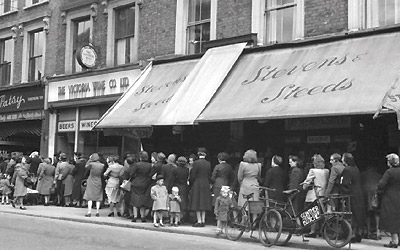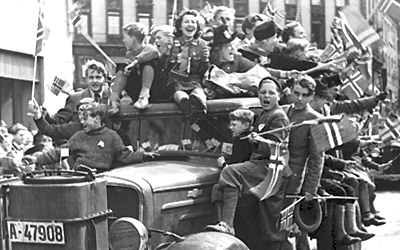Home | About Us | Subscribe | Advertise | Other Publications | Diary | Offers | Gallery | More Features | Obituaries | Contact |
|
|
|
|||||
Major John Davie, having taken part in the liberation of Paris as Military Liaison Officer to the BBC in August 1944 (The Guards Magazine Winter 2016/2017), was posted to Norway as Director of Public Relations. He wrote the following account for an English newspaper in early 1946. For five long years the picture of a starving Europe has been held up before the eyes of the British people, who have been continually asked to make more and more sacrifices that help might be brought to their unfortunate fellow beings in the occupied countries of Europe. Is this picture a true one or have we become the victims of our own propaganda? That is the question that many of us abroad are thinking about as we hear of further cuts in our rations at home, and shortages of every kind of necessity.
Prepared for the sight of living skeletons we were amazed at the fit and contented peasants who greeted us in the villages. ‘This is Normandy’, said those who knew, ‘a rich agricultural province. Wait until you get to Paris; then you will see what hunger really means’. Arriving in Paris on the evening of the liberation we received a tumultuous welcome, but it was not the welcome of a ragged and starving mob. Not for years had I seen people so well dressed, and in the shops were luxuries that had disappeared from London three years before. Enlisting the aid of a gendarme I asked to be taken to the poorest parts of Paris where once again I was assured I should find the starvation I was in search of. But it was in vain. Under nourishment there may have been, but so there was in London and in Glasgow. Of starvation in Paris, I could find no sign. In Belgium it was the same story. It was not until we reached southern Holland that we came upon a general state of under nourishment. Holland alone of all the countries liberated by the Allies in North West Europe seemed to have suffered from a serious shortage of food before our arrival. In Germany the people were among the best fed in Europe, and if, as we are told, they are to starve next winter, no population in the world is better fitted to face the ordeal. In Denmark, where poached eggs were dropped into my soup and cream cakes and ices were in abundance, the people admitted to me that their food had been almost unaffected by the war. And so at last I find myself in Norway. The plight of the people of this delightful country has long been a favourite subject for propagandists, and stories of the starvation in Norway have been as frequent as they were fearful. I am told that in the sparsely populated areas in the north the food situation is bad but here in Southern Norway I have looked in vain for signs of hunger. On the hot, sunny afternoons the roads around the capital are crowded with laughing, happy people bicycling out to the bathing beaches; all are dressed in the scantiest of clothing and their muscular brown bodies carry little conviction of the stories of a starving people. A Norwegian country doctor told me recently that he had never been without his bacon and eggs for breakfast these last five years, and only with the greatest difficulty did we persuade him that such a dish was considered a luxury in England. ‘Why do you not send us more coal’, he said, ‘you English you have so much. Without it we shall have to cut wood and we have no labour for that’. I could not help thinking of all those brown bodies sunbathing all day around the fjords that might have been cutting wood. Recently four ships arrived in Norwegian ports with food from England and Denmark. Two were held up for days because they could not pay harbour dues, the other two were not allowed to be unloaded until the cargo had been correctly priced. In each case the delays resulted in much of the food going bad. Justified perhaps, but scarcely the way a starving people behave.
As one who, from the nature of the job, has lived in these six countries continuously for the last twelve months and motored hundreds of miles each week, I feel as do all the British troops abroad that it is now time that we began first to look after ourselves at home and indulged in a little, well deserved self-praise on our own part in this tremendous war. These nations may have suffered inconvenience, individuals may have been tortured and others put in prison, but their sufferings have been small compared to those we have undergone at home. Few bombs have struck their cities, their casualties are small, and prevented from partaking in the war they have not spent their all. By continuing to harp on the misfortunes of others, not we alone forget the deeds we have done, but those who owe us all forget the part we played, remembering only to complain that we have not helped them more. John Davie served in the Grenadier Guards from 1932 to 1936, serving for two years in Bengal as ADC to Sir John Anderson, the Governor. In the Second World War, he served in North Africa and North West Europe with the Derbyshire Yeomanry. John Davie died in 1998, aged 88.
|
|||||
|
|||||


